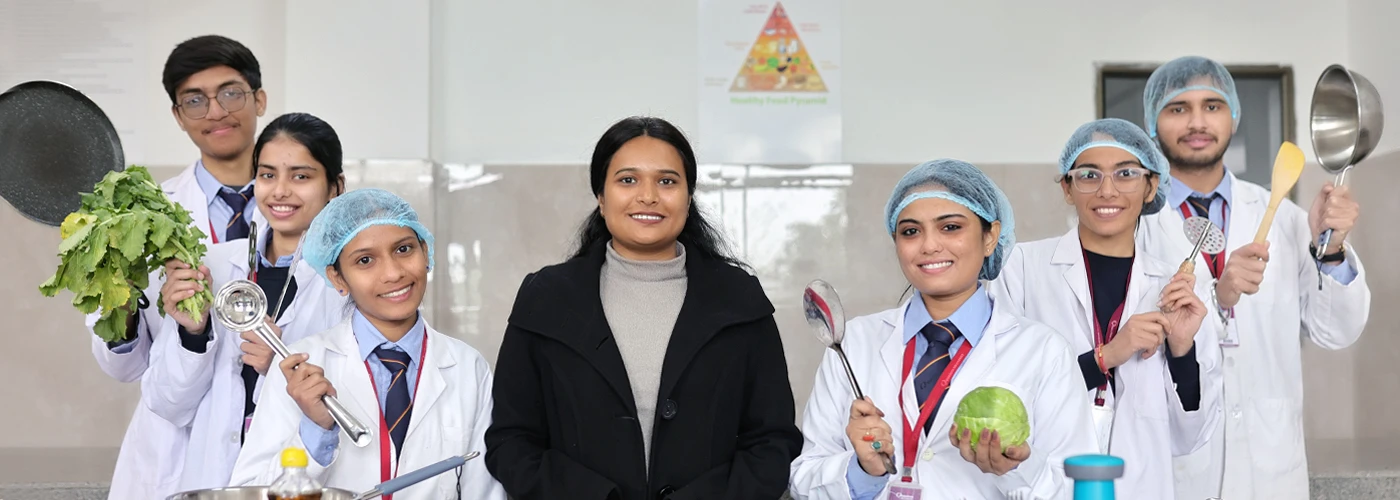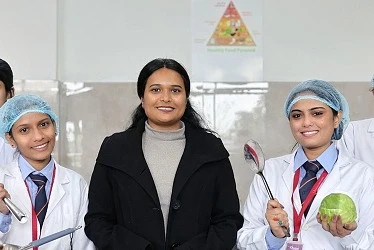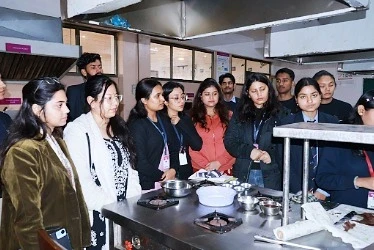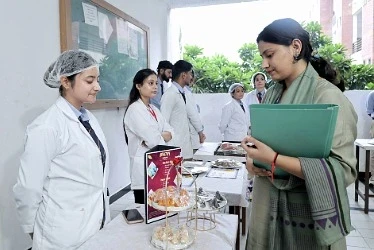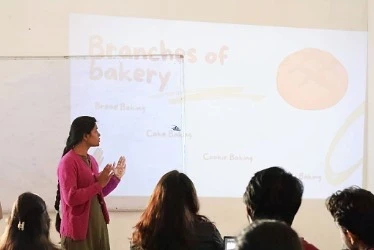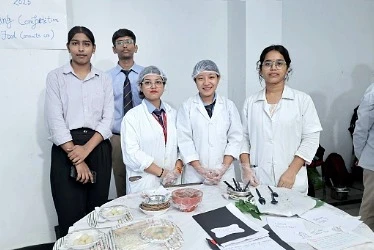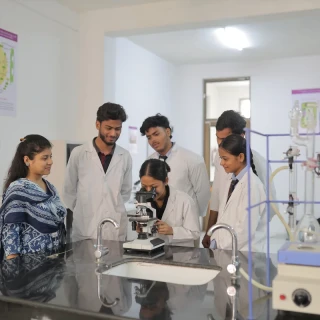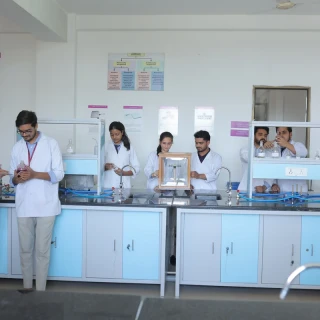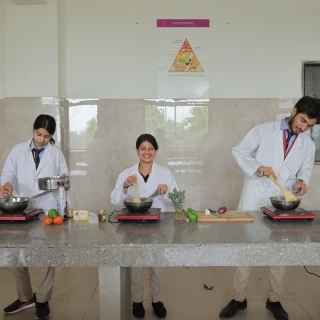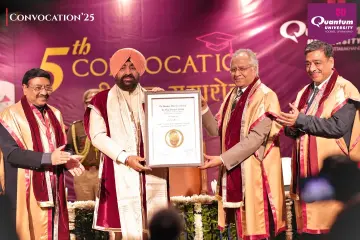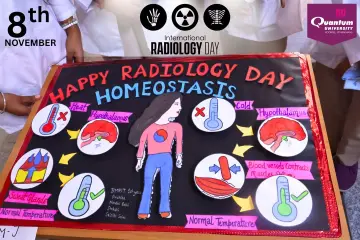Program Overview
The B.Sc in Nutrition and Dietetics program at Quantum University is designed to integrate scientific knowledge with practical applications, enabling students to promote nutritional well-being and address critical health challenges. The curriculum includes core topics such as therapeutic nutrition, public health nutrition, food microbiology, community nutrition, and diet planning, providing a comprehensive understanding of the field. Students gain hands-on experience through internships, lab-based training, and community outreach initiatives, allowing them to apply their knowledge in real-world settings. Emphasizing nutritional science, dietetics, and public health, the program prepares graduates for diverse roles in healthcare, wellness, and the food industry. Recognized as one of the best colleges in India for B.Sc Nutrition and Dietetics, Quantum University ensures its graduates are equipped with the expertise and confidence to excel in roles that make a positive impact on individual and community health.
Program Structure
The B.Sc. Nutrition and Dietetics program is designed to provide students with comprehensive theoretical knowledge and practical skills across the diverse fields of human nutrition, dietetics, and food science. The total credit requirement for the completion of the program is 189 credits, distributed among various course categories to ensure a holistic academic experience.
Students are required to complete 92 credits under the Discipline-Specific Core (DSC) category, which includes foundational subjects such as human physiology, food science, biochemistry, therapeutic nutrition, and clinical dietetics. These form the backbone of the nutrition curriculum and establish a strong scientific base.
The Discipline Elective Courses (DEC) constitute 32 credits, allowing students to choose from a variety of specialised areas such as sports nutrition, community nutrition, nutrigenomics, and geriatric nutrition, enabling them to tailor their education according to their interests and career aspirations.
The program includes Ability Enhancement Courses (AEC) of 8 credits, focusing on essential skills like communication, information and communication technology (ICT), research methodology, and biostatistics. These courses are aimed at enhancing the students' academic and professional competence.
Skill Enhancement Courses (SEC) are allocated 9 credits and provide hands-on learning opportunities through practical sessions in menu planning, food service management, therapeutic diet counselling, and laboratory techniques. These ensure that students are well-prepared to apply theoretical knowledge in real-world scenarios.
To encourage interdisciplinary learning, Multi-Disciplinary Minor (MDM) courses worth 9 credits are offered. Students can opt for electives from allied disciplines like psychology, public health, and management to broaden their perspectives and career options.
In addition, Value Added Courses (VAC) contribute 15 credits, offering certificate-based short-term programs in areas such as food safety, yoga and wellness, soft skills, and entrepreneurship. These courses are designed to enrich the students' profile and make them more industry-ready.
A Summer Internship (SI) of 8 credits is a mandatory part of the curriculum, allowing students to gain hands-on experience in hospitals, food industries, NGOs, and wellness centres. This supervised internship bridges the gap between academic learning and professional practice.
Finally, the program culminates with a Research Project (RP) of 16 credits, conducted in the final year. Students undertake independent research under faculty guidance, leading to the development of a dissertation, research paper, or conference presentation. This component is crucial for fostering scientific inquiry, analytical thinking, and evidence-based practice.
In summary, the program is thoughtfully structured to ensure that graduates possess strong theoretical grounding, practical skills, interdisciplinary understanding, and research orientation, preparing them for successful careers in clinical nutrition, community health, food industry, research, and higher education.
Teaching & Assessment
The B.Sc. Nutrition and Dietetics program at Quantum University is designed to blend academic knowledge with practical experience, addressing the demands of the healthcare, food, and wellness industries. The curriculum combines lectures on core subjects such as human physiology, biochemistry, food science, and clinical nutrition with hands-on training in therapeutic diet planning, food microbiology, biochemical analysis, and menu planning. Learning is further enhanced through workshops, webinars, and expert-led sessions from hospitals, food industries, and wellness organizations. Students also gain real-world exposure through field visits and outreach activities in NGOs, schools, and healthcare centers. Teaching methods include the use of ICT tools, case studies, group discussions, role-plays, and diet counseling simulations, creating an engaging, application-oriented learning environment. Additionally, value-added certificate courses in areas like food safety, yoga, wellness, and entrepreneurship support holistic development and improve employability.
Assessment is carried out through a balanced approach, including written exams, lab work, assignments, viva-voce, and continuous internal evaluations like class tests and case study analyses. Practical skills are assessed through simulations and demonstrations in diet counseling and menu planning. A key highlight is the final-year research project, where students conduct independent studies under faculty supervision, leading to dissertations or presentations. Industry exposure is ensured through mandatory internships in hospitals, food industries, wellness centers, and NGOs, with performance critically evaluated. This integrated teaching and assessment strategy equips graduates with strong scientific knowledge, technical skills, research capability, and professional competence, preparing them for diverse roles in clinical practice, community health, industry, and academia.







